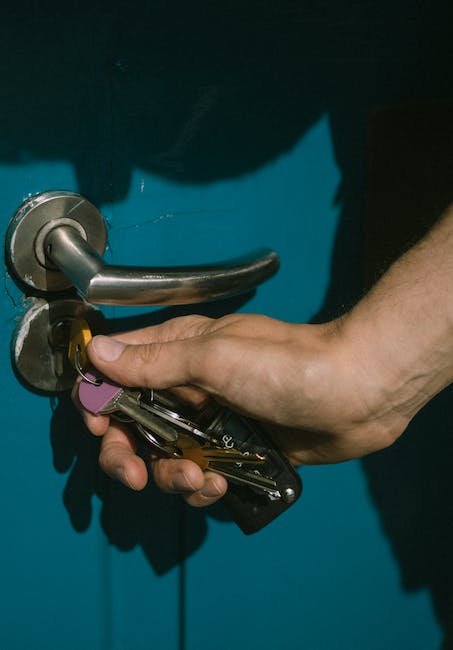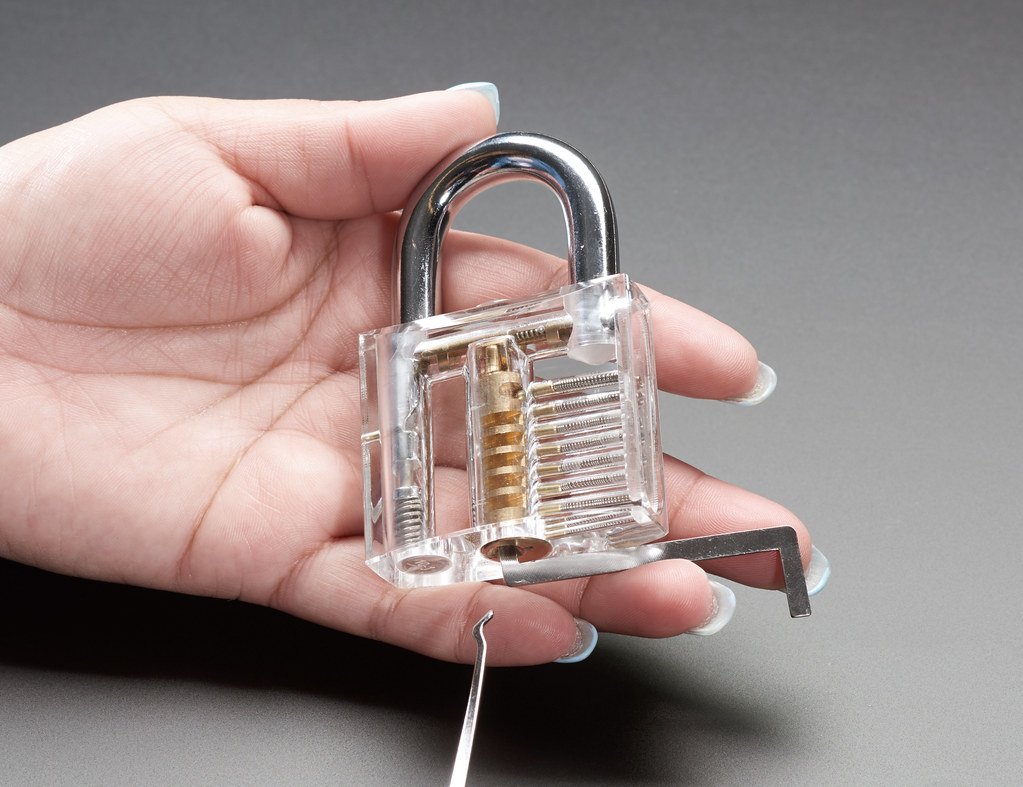Unlocking the secrets of the unseen, locksport transcends the mundane physicality of picking locks to unravel a philosophy steeped in mystery and depth. A captivating dance between curiosity and skill, this arcane artistry finds its essence in the metaphysics of picking. As practitioners deftly manipulate tumblers and springs, they also navigate a labyrinth of profound contemplation. From the connection between mind and matter, to the delicate balance between control and constraint, locksport ventures beyond the realm of mere mechanics, offering a philosophical journey into the depths of human perception and understanding. Delve with us into the enigmatic realm where lock and mind converge, as we explore the hidden philosophies that underlie the captivating world of locksport.
Table of Contents
- Exploring the Intersection: The Philosophical Significance of Locksport
- Unlocking the Abstract: Metaphysics at Play in Lock Picking
- Influential Schools of Thought: Perspectives on the Ethics and Morality of Locksport
- Mastering the Craft: Essential Practices for Ethical Lockpickers
- A Call for Reflection: Consequences and Considerations in the Pursuit of Lockpicking
- Q&A
- In Summary

Exploring the Intersection: The Philosophical Significance of Locksport
The Fascinating Blend of Philosophy and Locksport
Engaging in the thrilling world of locksport allows enthusiasts to delve deep into a realm that not only nurtures their technical aptitude but also provides a platform for exploring profound philosophical concepts. This unique blend of locksmithing prowess and existential musings gives rise to a thought-provoking intersection that transcends the surface level of mere hobby. Let’s embark on a journey to unravel the philosophical significance of lockpicking and understand the captivating implications it holds.
1. The Paradox of Security
Delving into locksport brings forth an intriguing paradox—a profound questioning of security and its illusory nature. As one hones their skills in manipulating locks, they inevitably face the enigma of security measures and their inherent vulnerabilities. The pursuit of unlocking various mechanisms showcases how the concept of security can be subjective and ultimately fragile, revealing the complex interplay between trust, control, and vulnerability.
2. An Exercise in Perception
Locksport not only challenges the physical complexity of locks but also serves as a constant reminder of the power of perception. The art of picking locks invites individuals to analyze, interpret, and decipher intricate mechanisms, revealing the necessity of meticulous observation and critical thinking. Unlocking these physical puzzles compels practitioners to explore the depths of their own cognitive processes, honing their ability to perceive and understand complex systems.

Unlocking the Abstract: Metaphysics at Play in Lock Picking
As we delve into the fascinating world of lock picking, we discover a hidden realm where the physical and metaphysical intertwine. Beyond the mere act of manipulating tumblers and pins, there exists a deeper connection to the abstract concepts of time, space, and perception.
Lock picking, at its essence, is a dance between the tangible and the intangible. It requires not only dexterity and skill but also an understanding of the intricate dynamics within a lock. One must navigate the labyrinth of springs, wards, and keyways with a delicate touch, all the while contemplating the philosophical implications that lie within this deceptively simple act.
In the realm of lock picking, time seems to stretch and contract, as every second feels like an eternity when you’re in pursuit of the perfect alignment. Each subtle movement of the pick becomes a meditation on the essence of existence itself, as if by manipulating the physical world, we can unlock the doors to the metaphysical realm.
- Perception: The art of lock picking challenges our perception of reality. It forces us to question the nature of boundaries and limitations, as we find ourselves dismantling the barriers that separate us from what lies beyond.
- Space: Lock picking invites us to explore the hidden spaces that exist within our own minds. In this pursuit, we venture into uncharted territories, dismantling preconceptions and expanding our understanding of what is possible.
- Harmony: Lock picking requires a delicate balance of technique and intuition. It teaches us the importance of finding harmonious connections, not only between the physical components of a lock but also within ourselves.
So, as we embark on this journey into the abstract through the art of lock picking, let us open our minds to the endless possibilities that lie beyond the surface. In this realm where physical and metaphysical merge, we may uncover not only the secrets of locks but also the mysteries of existence itself.

Influential Schools of Thought: Perspectives on the Ethics and Morality of Locksport
Locksport, the recreational and educational activity of lock picking, has long been a subject of debate when it comes to its ethical and moral implications. Various schools of thought have emerged, each presenting unique perspectives on the matter. Let’s explore some of the influential viewpoints:
- Utilitarianism: Advocates of utilitarianism assess the ethics of lockpicking based on its consequences. They argue that if lockpicking serves a greater good, such as enhancing security systems or aiding in emergency situations, it can be morally justifiable. The impact on society, rather than the action itself, determines whether it aligns with ethical principles.
- Deontological Ethics: Deontologists approach the morality of locksport by focusing on the inherent nature of the action. They believe that lockpicking, regardless of its consequences, violates fundamental principles of respect and property rights. According to this perspective, the very act of bypassing a lock is ethically wrong, irrespective of the context or potential benefits.
- Virtue Ethics: Virtue ethicists emphasize the character of the individual engaging in locksport. They argue that if lockpicking is pursued with proper intentions, such as skill development or a sincere interest in understanding security mechanisms, it can cultivate admirable traits like patience, creativity, and problem-solving. For them, the moral judgment lies in the personal virtues displayed during the activity.
These influential schools of thought provide diverse lenses through which one can analyze the ethics and morality of locksport. While some emphasize the utility and potential benefits, others concentrate on the inherent principles violated or the virtues developed through participation. It is through such critical examination that we can engage in thoughtful discussion and contribute to the ongoing discourse surrounding this intriguing and controversial recreational pursuit.

Mastering the Craft: Essential Practices for Ethical Lockpickers
Unlocking the art of lockpicking is a skill that demands precision, knowledge, and a strong commitment to ethics. To become a master in ethical lockpicking, it is crucial to adhere to a set of foundational practices that not only ensure your safety but also uphold the ethical standards of the profession.
Continuous Education: Locks evolve, and so should your expertise. Stay up-to-date with the latest advancements in lock technology, understanding the principles behind different mechanisms, and exploring new techniques. Mastering the craft requires constant learning and exploration, allowing you to adapt your skills to various types of locks and security systems.
Maintaining Ethics: As an ethical lockpicker, respect for others’ property and privacy is paramount. Only practice lockpicking on locks you own or have explicit permission to test. Never use your skills to engage in illegal activities, trespass, or invade someone’s privacy. Uphold ethical values at all times and use your abilities to foster trust within the field.
Community Engagement: Connect with fellow ethical lockpickers. Join forums, participate in discussions, attend workshops, and collaborate on projects. By engaging with the lockpicking community, you can not only exchange knowledge and techniques but also contribute to the advancement of the craft. Share your experiences, seek advice, and establish a network of like-minded individuals who prioritize the responsible use of lockpicking skills.
A Call for Reflection: Consequences and Considerations in the Pursuit of Lockpicking
In the realm of locksmithing enthusiasts, lockpicking has always sparked both curiosity and controversy. It is a skill that necessitates precision, patience, and a keen understanding of mechanical systems. As we delve into this captivating pursuit, it is crucial to stop and reflect on the consequences and considerations that accompany it.
The Consequences:
- Legal implications: Lockpicking falls within a legal grey area in many jurisdictions. Engaging in lockpicking without proper authorization can result in significant legal consequences.
- Ethical responsibilities: While lockpicking might be seen as a harmless hobby, it is essential to recognize the ethical implications of access to personal spaces and property.
- Safety concerns: Mishandling locks or attempting to pick certain high-security mechanisms without sufficient knowledge can cause damage or even render them inoperable.
Considerations to Keep in Mind:
- Professional development: Rather than solely focusing on unauthorized entry, consider redirecting the fascination towards a career in locksmithing or physical security.
- Legal compliance: Familiarize yourself with your local laws and regulations regarding lockpicking to ensure you engage in this pursuit responsibly and within the boundaries of the law.
- Educational approach: Embrace lockpicking as an educational endeavor, seeking to understand the principles behind different locking systems, rather than pursuing it solely for recreational or potentially nefarious purposes.
- Respect for privacy: Always demonstrate respect for the importance of privacy and consent. Keep the knowledge gained from lockpicking within ethical boundaries, refraining from exploiting it for unauthorized access to private spaces or property.
Ultimately, a passion for lockpicking should be accompanied by responsible behavior, ethical considerations, and a commitment to continuously learn and grow.
Q&A
What is Locksport?
Locksport is a community of enthusiasts who practice the art of lock picking as a recreational activity. It combines elements of skill, craftsmanship, and problem-solving to manipulate locks and gain access to their mechanisms without using a key.
Is Locksport legal?
Yes, Locksport is generally regarded as a legal activity. However, it is important to note that laws regarding lock picking vary from country to country, so it is essential to familiarize yourself with the local regulations and only practice lock picking on locks you own or have permission to manipulate.
What is the philosophy behind Locksport?
Locksport enthusiasts often view lock picking as a means to gain a deeper understanding of locks and their mechanisms. It is more than just a hobby; it embodies an exploration of the intricate relationship between human ingenuity and the puzzles that come with securing our belongings.
How does Locksport relate to metaphysics?
The metaphysics of picking refers to the broader philosophical questions that arise from the practice of lock sport. It delves into the nature of security, the dualities of lock and key, and the concept of control. By engaging in the practice, lock pickers question the very essence of what it means to be secure and challenge conventional notions of ownership.
Is Locksport compatible with ethical considerations?
Locksport encourages responsible and ethical practices. Enthusiasts are expected to adhere to a strict code of conduct, respecting other people’s property and privacy. The objective is to foster a culture of skill development, knowledge sharing, and mutual respect among lock pickers.
What skills can be learned through Locksport?
Locksport offers a range of practical skills. From honing fine motor skills and hand-eye coordination to understanding the mechanical intricacies of locks, enthusiasts develop problem-solving abilities that can be applied to various fields. Additionally, it cultivates patience, persistence, and the ability to think creatively.
Can anyone engage in Locksport?
Absolutely! Locksport is open to people of all backgrounds and skill levels. Beginners can start with simple locks and gradually progress to more complex ones as they gain experience and knowledge. The lock-picking community is known for being welcoming and supportive, providing resources for newcomers to get started.
Does Locksport have any practical applications?
Beyond the recreational aspect, lock picking skills can have practical applications. It can assist in locksmithing, physical security consulting, or even unintentional lockouts. The knowledge gained from locksport can also be used to enhance personal security by identifying vulnerabilities and understanding the limitations of different lock systems.
What are some misconceptions about Locksport?
One common misconception is that lock sport promotes criminal activities. In reality, the community emphasizes ethical practices and responsible use of lock picking skills. Another misconception is that locksport diminishes the effectiveness of locks, whereas it actually aims to enhance security by identifying and addressing vulnerabilities.
In Summary
As we conclude our exploration into the intriguing realm of locksport philosophy, we find ourselves captivated by the metaphysical implications of picking locks. What may seem like a mere hobby to some, reveals profound insights into the fundamental nature of human perception, knowledge, and existence.
Through the act of manipulating lock mechanisms, we become acutely aware of the interconnected relationship between the physical and the mental realms. Locks, the guardians of secrets, become a gateway for us to delve into the depths of metaphysics. Peering into the intricate world of pins and springs, we unravel the mysteries of our own consciousness.
Locksport challenges us to question the very definition of reality. As we refine our skill in the art of lockpicking, we begin to question whether the locks themselves possess an objective existence or are mere constructs of our minds. Are we manipulating locks, or are we manipulating the ideas of locks? Is it the lock that we break or the illusion of barriers within our own perspectives?
Furthermore, locksport illuminates the intricate dance between determinism and free will. In the moment of engagement between pick and pin, we teeter on the precipice of influence and choice. Does the lock dictate and limit our actions, or do we possess the power to shape our destinies by extending the boundaries of our perceived limitations?
In the pursuit of locksport, we discover a profound truth: that the smallest act of picking a lock mirrors the larger fabric of our existence. It reminds us that life itself is an intricate blend of mechanical precision and human agency. We grasp that just as the pins align and the lock surrenders to the skilled picker, so too can we overcome the obstacles that constrain us.
So, fellow seekers of philosophical wonderment, let us continue to explore the world of locksport, not merely as an experiment in dexterity, but as a gateway to the metaphysical realms that intertwine with our everyday existence. With each pick, we unlock not only the secrets of locks but also the secrets of our own understanding, propelling us further along the winding path toward enlightenment. Let us cherish the juxtaposition of lock and philosophy and relish the dance between the tangible and the intangible, for in doing so, we tap into the quintessence of our shared humanity.
As an affiliate, my content may feature links to products I personally use and recommend. By taking action, like subscribing or making a purchase, you’ll be supporting my work and fueling my taco cravings at the same time. Win-win, right?
Want to read more? Check out our Affiliate Disclosure page.